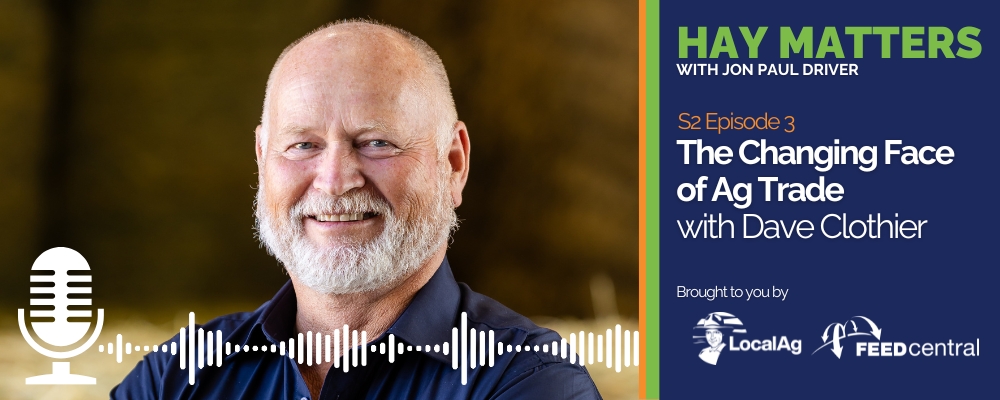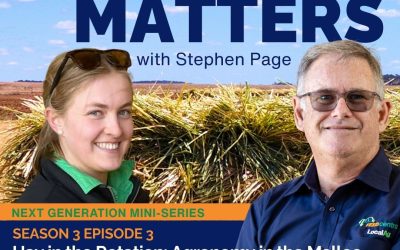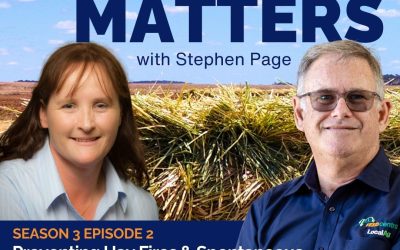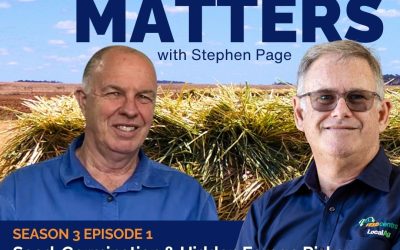
Podcast Highlights
In the latest Hay Matters Podcast, brought to you by LocalAg and Feed Central, Jon Paul Driver and National Sales Manager Dave Clothier and National Sales Manager Dave Clothier explore the early days of LocalAg and the wider impact it will have on Australian agriculture.
They discuss how extreme weather, from drought and scorching heat in the south to heavy rains and flooding in the north, is reshaping feed supply and market dynamics. Real-time feedback and market adaptability are charting a new course for ag across the country with customers asking for more flexibility and transparency with their purchase decisions.
- The platform presents two distinct options: traditional full-service account management and a flexible, direct interaction model.
- Early feedback indicates that buyers and sellers value the choice to adopt a transaction style that best meets their individual needs.
- Sellers can now showcase their entire range of offerings with free listings, allowing potential customers to discover additional products and services.
- Customisable features let users tailor transactions to specific requirements, such as negotiating part truck loads or managing customised deals.
- Overall, the platform is fostering more direct and transparent communication in the agricultural market, enhancing both efficiency and customer engagement.
- On the market front, despite extreme weather including drought in some regions and heavy rains in others, buyers are proactively securing quality feed ahead of winter.
Read Transcript
Jon Paul Driver 0:05
Welcome to the Hay Matters podcast brought to you by LocalAg and Feed Central. Today on the podcast, I’m joined by Dave Clothier, he’s the National Sales Manager with Feed Central and LocalAg, welcome to this podcast. Thanks.
Dave Clothier 0:17
JP, it’s been a while since we’ve had a yarn, but really excited about this conversation we’re going to have, mate.
Jon Paul Driver 0:23
Now this is particularly special because we’re two weeks in on LocalAg, give me your first impressions.
Dave Clothier 0:30
First impressions were we couldn’t the launch couldn’t come quick enough for us JP, we were wound pretty tight. We needed it to happen. The whole team wanted to have a crack at getting into it and talking to our buyers and sellers across the country about this new platform. So two weeks in, it feels like a month in right now, we’ve been extraordinarily busy explaining to our customers the advantages of both LocalAg and at the same time giving them reassurance that what we’ve provided in the past hasn’t changed, we’ve just added new functionality and opportunities for them.
Jon Paul Driver 1:07
And do you have any initial stories to tell?
Dave Clothier 1:10
Like all these things, it’s interesting when you start any new venture, you’ve got free license pretty much, to make it up as you go. And that’s what we’ve been lucky enough or fortunate enough to do through the conversations and the knowledge sharing internally to get our conversations better and to learn as we go. But what’s come out of the last couple of weeks is really the feedback that we’re getting from customers. Not one recipe suits everybody. They want to tailor make their experience, buying and selling or both. Some want to stick to the Feed Central platform and use our account management and full QA service, because they’re just time poor and they’ve got certain specifications, and they want us to manage that on their behalf. That’s cool.
Jon Paul Driver 2:02
That’s the traditional model.
Dave Clothier 2:04
That’s the traditional model. Whereas the LocalAg platform, there’s advantages for both. There’s advantages for the seller that says, I haven’t got to have QA in place, I haven’t got to have a feed test. I can, I can sell part truck loads, or by the bale, or whatever suits. With Feed Central, it had to be full truck load, so it didn’t get advertised once we got below those bale numbers and so forth. So it lets them tailor make it from from that side, from the from the buyer side. It just gives them direct contact. So between them, you’ve got the two experts talking to each other, which are the buyer and seller of anything, whether it’s machinery or livestock or Hey, anything in ag, you’ve got the two experts talking to each other in a transparent platform. Everything’s legal. We’re capturing everything. So the dispute resolution is an easy process, obviously, if it ever comes to that, but it’s just a very welcoming thing. So we have had clients in the first two weeks where this one deal could go through LocalAg, because it allowed the two parties to talk to each other, cut the deal they wanted. Job was done. The other one, the particular product this guy wanted, or a few customers have wanted, that seller didn’t want to deal with the general public. He wanted us to run that sort of his business in the background. So we did that deal through the feed central plant trading platform. So we’ve got both experiences and the more I think about that, the more scope it gives both buyers and sellers to customize that customer experience to their own needs at a particular time and style of doing business whatever they want to do. That’s a real cool thing that’s come out of it in the last couple of weeks, and we’re starting to get feedback and nearly testimonial sort of stuff from customers, like how relieved they are number one, that what they’ve enjoyed for the last 22 years hasn’t changed. And number two is now it’s given us the scope to tailor our experience with blinkers off so to speak, you’re
Jon Paul Driver 4:21
genuinely excited about this. Oh, yeah,
Dave Clothier 4:25
man, I am, I am. It’s hard to pick it up through a microphone, but you have it is exciting. Like, you know, one of the things in business, I come from an agricultural background, manage some pretty big properties around Australia. Like, you’re dealing with so many different people for different things on the farm every day of the week, or not every day of the week, but consistently now there’s an opportunity for for those same sort of people like myself back then to now say, Well, no, I can just deal through, do through deal through Feed Central’s LocalAg, to tailor make my purchase or selling decisions on anything in. AG, you know that they still have the option to go anywhere else, obviously, but you know, because we are now everything in, AG, like the potential, whether they’ve got something advertised somewhere else or whatever, which is like we’ve only been in existence for two weeks. And we’re not naive. People are trying to sell stuff and buy stuff every day of the week so they can bring their current listings across the LocalAg for nothing to a ready made 22 year old audience. Like, who doesn’t want that for free? Jeez.
Jon Paul Driver 5:37
Now take me through the vision for a year from now. Alrighty.
Dave Clothier 5:40
Oh, now we are getting excited. JP, this, this. This really excites me, because at the end of the day, every single person we’ve been buying and selling fodder through is a small part of a larger business, whether it’s a mum and dad grazer on a small operation on the east coast or the coastline of Australia, through to the larger pastoral operations and the corporate operations, it’s a very small piece of what we do, of what they do, I should say, now so when a lot of these people, even the mum and dad grazes, are getting pretty smart, with their siblings coming through, building their own websites and platforms to promote their own business. You know, whether a lot of them have got trucks there, they run livestock, they’ve got fodder, they got on farm storage for grain and fertilizer and all these sort of things, and they’re trying very hard to promote that business on their own. So the guy that’s buying a load of hay through us today that potentially, you know, runs 500 breeders, or 1000 breeders or something, or is a broad acre fellow, and he is a grain grower or whatever, and he’s got freight and all sorts of bolt ons, he can bring that whole platform across onto LocalAg, again for free. I’ll say the word again for nothing, and promote his whole business without tailoring anything. Just bring it across. So now I can promote everything that his business is, and any customer, any buyer that might be traditionally buying a load of hay through that fella, or a bull or a horse or whatever it is, can go on and look at that guy’s profile and shop front and go, Oh, he’s also got all this other stuff. While I’m there, I’ll get something else. And again, it’s tied into the secure payment and the transparent sales process, or buying and selling process. So that excites the heck out of me? Because I know how tough it is in business today to be given the opportunity to get access to a national database of customers with no extra effort is a bit of a no brainer in my book.
Jon Paul Driver 7:56
All right, let’s change gears here just a little bit and make sure that we talk about what’s going on in the marketplace, because you’re not giving up any of your expertise in the marketplace. What are you seeing out there? Big continent,
Dave Clothier 8:09
Australia, that is for sure, and unfortunately, it’s it’s always somebody’s turn to enjoy a tremendous season, and it’s always somebody’s turn to enjoy at the harsher end of seasonality. At the moment, we’ve, you know, at both extremes of Australia, we’ve got South Australia and Western Vic, in particular, nearly the whole of Vic experiencing extraordinarily hot conditions and dry conditions. You know, in the mid 40 degrees Celsius, down in the southern end of Australia. Parts of South Australia last year received 150 175 mil which is six to seven inches of rain. They’ve depleted their livestock numbers because of this long, extended drought. And demands picked up quite a lot because there is very little fodder available in the South. I can tell you, I’ve had conversations with dedicated growers that are second third generation, that for the first time in living memory, they’ve become buyers of fodder versus sellers, because they run their livestock. So that’s that’s not good to hear, but this is the country we live in. And then you go to the north. One of my sons lived in lives in northern Australia. He’s had two meters of rain since Christmas, just phenomenal stuff. And and it’s not over yet. For those guys up there, you’ve got flood conditions in the top end of Western Australia from a cyclone. So north and south are polar opposites. In conditions. You’ve got demand in the North for people with stranded cattle and flood conditions that just need to maintain their livestock. And then. You’ve got in in the south, where it’s a survival scenario, they’re trying to hang on to their their core flock, or their core herd, and then in the middle, it’s pretty damn good. You know, Southern Queensland, northern New South Wales, like there’s not too many that could argue we’ve, we’ve had a pretty good run. There is plenty of feed across, you know, northern New South Wales, up into Central Queensland. It’s just a phenomenal season. Sure, there’s some dry areas, like there always is through a when you’re in a summer rainfall pattern storms, you’re either under it or you’re not. So there would be some people that have missed, missed out, but generally speaking, some very good seasonal conditions. Yeah, across that center part. So different demand, north and south. We’ve got the weaning program that’s about to start next month, March, April. So there’s people starting to come in. We’ve seen a lift in demand the last couple of weeks, significantly through both account sales or account customers and just the prompt market. So that’s starting to happen. We’ve got some pretty intuitive people that are recognizing that now is the time to buy because we’ve got the most product available right now. They know it’s going to run short and in in winter or shorter supply, so they’re picking the eyes out of what’s there and filling their shedswith the best product available. So horses for courses, yeah.
Jon Paul Driver 11:37
If you’re talking about shortages, are we seeing those hay prices escalate.
Dave Clothier 11:42
It’s a bit of fun. Normally we would, and I think, and we certainly will in the months ahead, as we get closer to winter. Right now, because of the seasonal conditions I just explained, apart from the south is in South Australia and parts of Victoria, there’s a pretty good body of feed where the mouths are, the majority of mouths. So, so what that’s done, it’s demand has been low. It’s only lifted in the last couple of weeks. So I think there, there are quite a few growers that are seeking cash flow, which is has made it depending on the situation of the grower. In mind, there is still room for negotiation right now, because they are seeking a bit of cash flow. You know, the other ones that aren’t, aren’t seeking that cash flow pretty much, lock their shed up and they’ll wait. They’ll wait, you know, for that first frost type scenario, and up she’ll go in price, that is, you know, the quality thing. I think the quality thing is a real issue. A lot of the, if we talk about cereals for a moment, until you get down the bottom of New South Wales and into Vic, you know, there’s some very good quality, high, low NDFs, good protein, energy. The whole thing shattered all that because of the big crops that we saw through New South Wales, grain belt and so forth and southern Queensland, big, thick stems, high NDF weather in the wind rose sort of stuff, like a lot of those medium quality lots through New South Wales and Queensland. So quality hay is getting further away, although there is a lot of good legume ha being made now, is in loosen you know? So, yeah, I’d be, I’d be watching it pretty closely and thinking about what you need, if it’s a high quality product you you’re needing for the weaning type program, or anything else you’ve got coming up, I’d suggest you want to be looking now, or you’re just going to be paying more for it down the track, and it’ll get further away. If it’s a lower grade product, like what we’re calling a B grade, an FC, B grade and below that’s pretty much everywhere. But I would suspect, you know, if the tap got turned off with weather, as our livestock numbers in Australia are incredibly high, an all time high. Numbers on feed are an all time record. If we did run into a tough pinch, like we’re going to run pretty short through the winter period, I’d reckon of quality feed, not not that, not that it’s need to be feared, because there’s always feed out there.
Jon Paul Driver 14:23
Adequate inventory of middle grade and FCB kind of grade, yeah and low, yeah and lower, while the supplies of high quality FCA or higher will be tight.
Dave Clothier 14:40
Will be tight, yeah? For our queens, for our northern buyers, it’s further away. Quality hay is further away.
Jon Paul Driver 14:50
Well, anything else your excitement about LocalAg, is contagious.
Dave Clothier 14:57
Yeah, well, it’s it’s contagious within the culture of the team at the moment is infectious. Like everyone is excited about the opportunity conversations are becoming easier. So who doesn’t enjoy that? And the opportunity of expanding into all other categories related to AG, is damn exciting.
Jon Paul Driver 15:19
Dave, it’s been wonderful to visit with you about the new and exciting LocalAg, just the process is fun to watch, too, and to hear Feed Central and LocalAg, learning and growing together is something that I hadn’t expected to hear so that that’s very interesting to me. And then your your commentary on the extremes that are blowing my mind, the extreme weather that Australia has is just mind boggling to me. So with that, thank you very much. Again, I’ve been joined by Dave clouthier, he’s the National Sales Manager for Feed Central and LocalAg, again, a big thanks to you today for sharing your insights, and this podcast is proudly presented by Feed Central and LocalAg, stay tuned for upcoming episodes.



